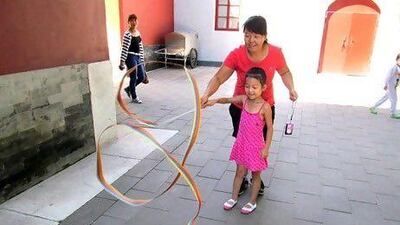BEIJING // On a sunny day in Beijing, Feng Chenyang is doing what 10-year-olds the world over enjoy during the summer holidays: paying a visit to the park, playing under the watchful eye of his mother.
He also relaxes on the park benches, admires the statues of national heroes - such as Sun Yat-sen, who helped to end imperial rule - and generally mellows out.
Chenyang was able to spend four days in the capital doing what kids do before school starts this month in his home province of Shaanxi in central China.
It appeared to be a welcome break.
For the first month of his summer holidays, he spent six days a week - two to three hours a day at least - studying mathematics, English, linguistics and art.
"I sent my son to those classes for the discipline. He is a bit wild," said his mother, Hu Xiaomei, 33, who runs a construction machinery business with her husband, Feng Weipeng, 34. "He doesn't enjoy school that much. Going to those classes will make him more disciplined. That's on the minds of most Chinese parents."
Indeed, there is nothing unusual in Chenyang's experience over the summer. While he has spent some of the time playing badminton, swimming, playing video games and visiting an amusement park, for him and many children his age the holidays are as much about getting a headstart on schoolwork as they are about relaxation.
According to state media, an estimated two-thirds of children attend some kind of classes over the summer holidays, which typically last two months.
The summer cramming sessions sometimes begin when students are younger than Chenyang. Yang Haixiao, 7, also spent the first month of the holidays having lessons in mathematics, linguistics and painting.
"He attended some very intensive pre-school classes," said his mother, Wang Pingping, 30. "We're just afraid that he might fall behind the other kids. All of them are doing these classes. If you don't put as much effort into pre-school, there might be a situation where it's very difficult to catch up. It's a lot of trouble for him and for us."
During the first month of the summer holidays, Haixiao spent about two-and-a-half hours on lessons each morning before spending more time on his homework in the afternoon.
In a country that for millennia placed great emphasis on academic achievement, employing a highly competitive examination system to select mandarins, parents will spend thousands of yuan to give what is often their only child any educational advantage, even if that means taking time away from play. Costs for summer lessons can be as high as 50,000 yuan (Dh28,900).
"We have a very strong belief that academic learning is the foundation for life," said To-chan Singpui, a lecturer in the Department of Early Childhood Education at The Hong Kong Institute of Education.
"It's like the belief in [the ancient philosopher] Confucius. We have a very strong belief in the kinds of values of Confucian learning. Mainland parents and Hong Kong parents, because we're Chinese, we share this common value."
While video games and the internet are favourite pastimes for most children across the world, Chinese children have their own unique diversions. Ma Baobao, 7, has been taking weekend classes in calligraphy as well as visiting parks with his grandmother, a 55-year-old retired factory worker.
"His calligraphy is almost perfect. I think it's a basic requirement for a Chinese person," she said.
Zhou Lirong's daughter Dou Yuhe, 6, is about to begin primary school so this is probably her last carefree summer holiday.
She has spent much of the summer rollerskating, taking dancing classes and watching cartoons at home, although there have also been English lessons to prepare her for primary school.
"I have almost spent the whole time with my daughter, except for the time she goes to those classes," said Ms Zhou, a housewife. "I enjoy it a lot because once she's started primary school it will be very difficult for me to spend time with my daughter because they have all sorts of summer camps and group activities."
It is unsurprising many parents give their children extra lessons over the summer holidays, as the Chinese education system is notoriously competitive.
A 2010 paper by academics from University College London found that more than one third of children aged between nine and 12 in eastern China suffered stress-related illnesses and said measures to cut stress in schoolchildren "should be introduced urgently".
"The Chinese educational system is highly competitive from the start of primary school, with great emphasis on academic performance and intolerance of failure," said the study, published in Archives for Diseases in Childhood.
A few lucky children do get to enjoy the whole summer without spending time in a classroom. Yuan Weiwei, 30, for example, has made a point of not enrolling her five-year-old son, Li Zhuoqi, in any summer lessons.
"This summer vacation is just for fun," she said. "I think most parents feel they have to prepare their children so early. I don't blame them but I think the best thing is to find as much non-working time for the children as possible."


